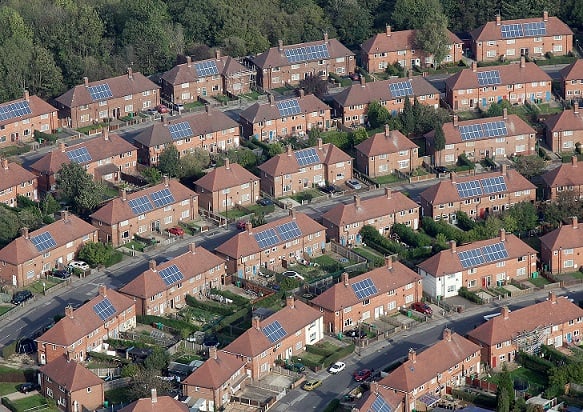
Over 4,000 Nottingham council homes have been fitted with solar panels. Image: Nottingham City Council.
Nottingham City Council has met its climate change targets four years ahead of schedule following a number of energy saving initiatives and significant investments in renewables across the city.
According to recent government statistics, the city has achieved a 33% reduction in carbon emissions since 2005, beating a 26% target set by the local authority for 2020. The local authority says this makes it the best performing of the core cities outside of London, as it now produces three tonnes less of CO2 per year when compared to 2005.
Councillor Alan Clark, Nottingham City Council’s portfolio holder for energy and sustainability, said: “It’s a great achievement to have met this important target four years early. Nottingham is at the forefront of sustainability awareness and these latest figures maintain the city’s position as the UK’s most energy self-sufficient city.
“There has been a real move towards sustainability in the city with a wide range of organisations in the public, private and voluntary sectors carrying out vital work to reduce our environmental impact. Beating our target is a fantastic recognition of the efforts across the city to achieve this aim.”
Speaking to Solar Power Portal earlier today, he added: “I think it's the all-round effort of the city as a whole so private sector, universities and so on have all done their bit in reducing our carbon footprint.”
Solar has formed a large proportion of the initiatives taken across the city, including the completion of the UK’s largest solar carport in August 2015, and the installation of solar panels on over 4,000 council house roof tops.
“We think we've got the highest proportion of solar panels per household in the country so that's clearly making a difference and it's taking people out of fuel poverty,” Clark added.
“
“We think we’ve got the highest proportion of solar panels per household in the country so that’s clearly making a difference and it’s taking people out of fuel poverty.”
Despite this roll-out of solar across the city, cuts to government support for solar enacted earlier this year have caused Nottingham City Council to put a pause on all new installations until the business case can be made to support new spending on solar.
Clark is clear that councils will be unable to spend their money unless a return can be made however speaking at the Solar Power Portal Roadshow in Nottingham back in April he said that councils were still willing to part with cash if a 5% return can be promised.
“Of course the change in FiT has hit our ability to meet our ambitions. That was clearly a blow to us as much as it anyone else in this field. But we are determined to continue to install renewable energy wherever we can make the business case,” he said.
Despite the council’s reduced ability to invest in solar, the growth of commercial projects has seen new installations continue in the city. The Nottingham Wildcats basketball team installed a 133kWp system earlier this year which is expected to save the club up to £3,000 a year on its energy bills.
In addition to solar, the council has made significant progress in decarbonisation of its transport infrastructure. Councillor Nick McDonald, portfolio holder for business, growth and transport, has claimed that the city now has Europe’s largest fleet of electric buses and is securing government funding for electric vehicle charging infrastructure and other electric fleet vehicles.
In January, the Department for Transport awarded £6 million to Nottinghamshire to pay for the installation of 230 charge points across the county.
Despite the rapid progress the city has made to achieve its targets ahead of schedule, Clark added that the city council would continue to make further efforts to reduce its carbon emissions.
He explained: “We're going to be cracking on, it doesn't mark the end just the end of one phase. We've got an ongoing review partly because we've got new policy officers in as well so they want to review how we've been doing on the strategy and start something new.”

